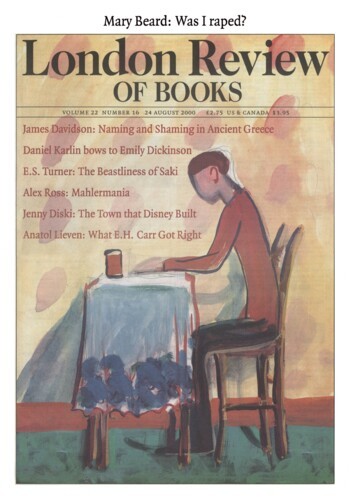When Murray Gell-Mann proposed the existence of a kind of sub-atomic particle in 1964, he came up with the name ‘quark’ after a phrase in Finnegans Wake: ‘Three Quarks for Muster Mark!’ A new kind of genetically modified flax resistant to herbicides has been developed in Canada and christened ‘triffid’, allegedly in honour of a nebula – Alan McHughen, the scientist responsible, may be a mild-mannered biologist by day, but at night he’s an amateur astronomer. He’s dismissive of fears that the association with John Wyndham’s 1950s novel won’t do the controversy-strewn world of GM any favours; and he’s done that clever thing of appropriating an opponent’s discourse: the Canadian triffid is an ironic (and more modern) riposte to all the talk about Frankenstein foods and the like. Anyone looking for a good reason to distrust genetic science, however, need look no further than Brewer’s Dictionary of Modern Phrase and Fable. It’s not published till November, but Cassell have sent out a taster of sample entries, including one for Dolly, ‘the world’s first cloned sheep, born on 5 July 1996 at the Roslin Institute near Edinburgh’. Perhaps Gell-Mann would have called her Molly, but the depressing fact is that she was named after the ‘full-figured country singer Dolly Parton’ because she was cloned from a cell nucleus taken from another sheep’s udder. And this, we are supposed to believe, is progress; though the hopelessly optimistic or paranoid might see some cosmic connection in the fact that ‘quark’ is a variety of low-fat, soft cheese made from skimmed milk.
Dolly is preceded in Brewer’s Modern by Barbie doll and Lara Croft (‘the feisty busty heroine of the Tomb Raider computer game series’), but the book isn’t devoted entirely to artificially well-endowed women. They are joined by Essex man, ‘a type of socially ungraced and culturally deprived Conservative voter ... who in the late 1980s worshipped the consumer-oriented gospel of Thatcherism’ – Thatcherism, of course, is cross-referenced. Essex man is balanced by entries for Champagne socialist and Chiantishire. There’s no mention, however, of Delia Smith, whose ‘writing and cookery programmes’, so it says on the box of her forthcoming video, ‘cut across all ages, creeds, sexes and social classes’. The source of this accolade is, rather hilariously, the Daily Mail. Also left out is Keith Flett, veteran man of letters (see page 4) and socialist antidote to the Daily Mail as well as just about everything in Brewer’s Modern, who has edited a collection of essays, endorsed by Eric Hobsbawm, called The 20th Century: A Century of Wars and Revolutions (Rivers Oram, £14.99).
Not to be outdone by Brewer, Oxford are marketing their ‘major new edition’ of the Oxford Compact English Dictionary (£11.99) on the way its new words ‘reflect Y2K Britain’. ‘In a world of spin and political correctness,’ the press release says, ‘the possibility of becoming a lookist society is one possible conclusion to emerge from the new words included.’ It’s good to see that they haven’t abandoned the tentative tradition. Frankenfood is one of the new words, though triffid, as in Canadian flax, is presumably too recent to get in. There’s also a list of ‘fashion words that came and went’ – nice pun there – including ‘immensikoff (1870s heavy overcoat)’, ‘smasher (late Victorian hat)’ and ‘directoires (long knickers)’. Marks & Spencer, despite their profits (see page 4), could maybe do with reviving some of these. Who knows, they could even weave them from triffid.
The bird on the cover of Stephen Green-Armytage’s Extraordinary Chickens doesn’t look entirely unlike a triffid (as in Day of, not as in a potential range of M&S underwear). Green-Armytage, the ‘author/photographer’ of Dudley: The Little Terrier that Could, a story for children, ‘has now produced a unique adult book, introducing the bizarre and beautiful world of exotic ornamental chickens’, due in October (Abrams, £15.99). ‘Chickens of all sizes, shapes and colours parade through these pages’, genetically modified in the traditional way, by crossbreeding.
Send Letters To:
The Editor
London Review of Books,
28 Little Russell Street
London, WC1A 2HN
letters@lrb.co.uk
Please include name, address, and a telephone number.

